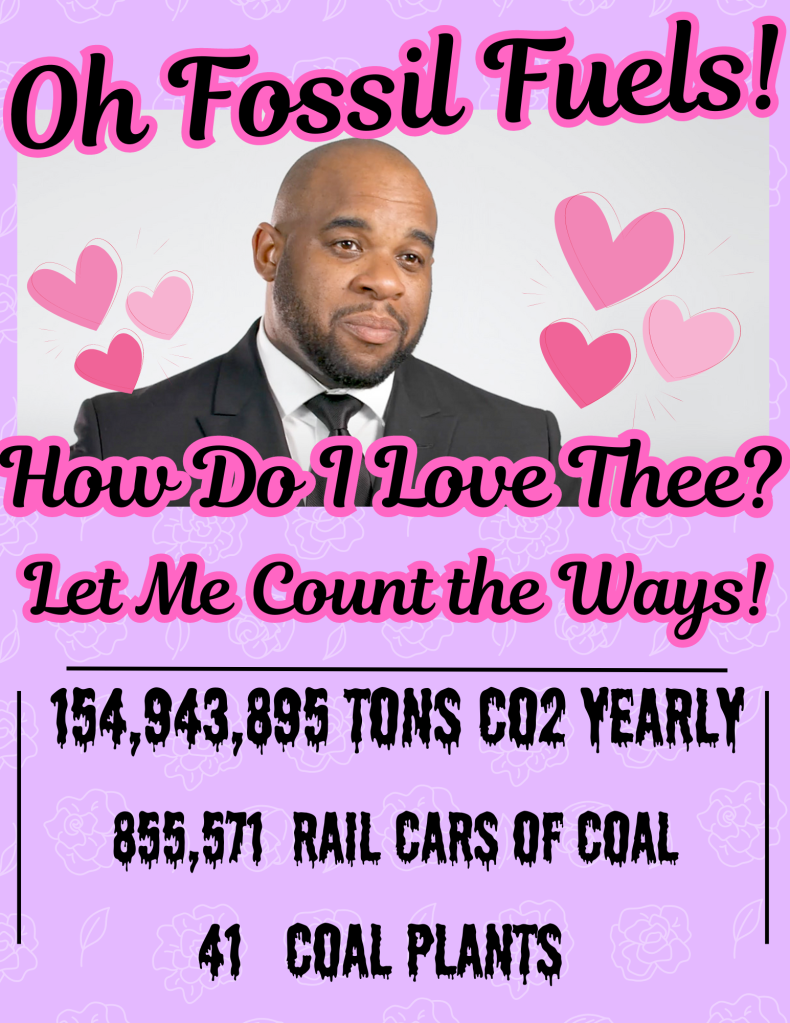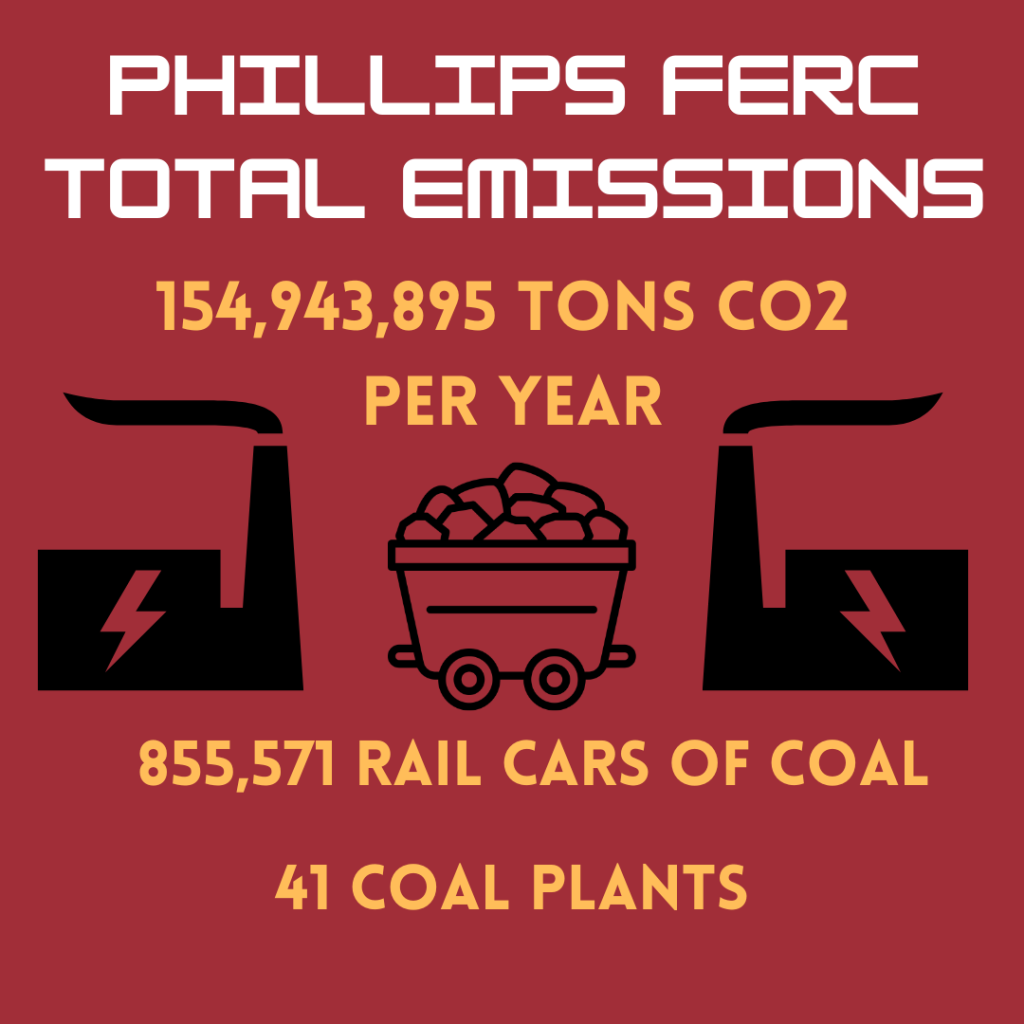
Did you know? Your neighbor Willie Phillips plays a major role in deepening the climate crisis!
How? Well…Phillips is the chair of FERC!
- The Federal Energy Regulatory Commission (FERC) is the government agency in charge of regulating our national electric grid, and approving most major new fossil fuel energy projects- including things like fracked gas pipelines and natural gas export terminals.
- FERC is a rubber stamping agency for the fossil fuel industry. They have almost never rejected a pipeline project.
- From 1999-2017 they rejected only 2 out of over 400 proposed pipelines!
This means FERC is a core part of exacerbating the climate crisis, but also a place where we could begin to see a real transition to renewable energy and full decarbonization.
- FERC has NO climate impact standards and does minimal greenhouse gas emissions analysis when looking at proposed energy projects.
- Communities that are struggling against the construction of new polluting projects in their areas are faced with a FERC comment and appeals process that one DC Circuit Court judge described as a ‘Kafkaesque regime.’
- In the words of sitting Commissioner Allison Clements, FERC’s myopic focus on precedent agreements, contracts for future pipeline capacity, causes it to miss critical evidence demonstrating projects are not needed and therefore not in the public interest.
- FERC reform has been a massive failure due to energy industry pressure. In 2022 the then-FERC chair, Richard Glick, attempted to draft new standards for greenhouse gas emissions and was forced out of his job by Joe Manchin. Willie Phillips replaced Glick.
Willie Phillips’ FERC:
Since he began chairing FERC in 2023, Willie Phillips has made a hard turn away from FERC reform.

Phillips’ FERC has approved fossil fuel projects that will emit:
154,943,895 Tons CO2 per Year
The equivalent of:
855,571 Rail Cars of Coal
41 Coal Plants
Phillips has paid a great deal of lip service to environmental justice – claiming that FERC will begin to account for the impacts of new energy projects on communities of color and low-income communities. Phillips claims that disadvantaged communities will be heard “in a meaningful way, every step of the way.”
After a year of promises we can see that Phillips has not delivered. Far from being a fighter for justice, Phillips has embraced FERC’s role of fast- tracking fossil fuel development.
The Details:
No Change in Decision Making:
- Willie Phillips often meets with frontline groups impacted by fossil fuel development, yet Phillips has never dissented or voted no on ANY project during his 2.5 years at FERC.
- FERC has not rejected ANY projects based on violation of environmental justice standards, even those that have demonstrated significant impacts on marginalized communities.
- Simply listening to impacted groups is not the same as giving them meaningful power in the FERC process.
Weak Environmental Justice Analysis:
- In 2021 FERC was remanded by the U.S. Court of Appeals for the District of Columbia Circuit for intentionally using a weak Environmental Justice analysis.
- Vecinos Case: FERC had looked at a 2 miles radius around three LNG projects to determine if air quality impacts would fall on marginalized communities. The court found that FERC’s own documents had determined that the air quality impacts would ultimately be within a 31 mile radius. FERC had offered no “rational connection between the facts found and the decision made.”
- Since then FERC has used a wider radius in assessing EJ impacts. But it has continued to ignore the findings.
- When energy projects were found to disproportionately impact communities of color, FERC ordered them to plant trees (2022) and reduce noise (2023). These are solutions that do nothing to reduce the permanent health and ecological impacts these industries have on communities.
- FERC is continuing its history of environmental racism, but making note that it is happening.
This April FERC is supposedly giving a report on the results of its two-year Accountability FERC project – outlining these environmental justice efforts. We look forward to reading it!
Will Phillips take a stand or will he maintain his career at the expense of the planet?

Demands:
- We demand that FERC reject all new fossil fuel development and move towards full decarbonization of the energy system in favor of clean renewable energy.
- An immediate first step Phillips can make on this path is to institute a pause on all new LNG export projects, exactly as President Biden has mandated at the US Department of Energy, pending a review of those projects’ impact on our climate and communities.
- Another step Phillips can make on this path is to institute the new Natural Gas Policy and greenhouse gas emissions thresholds first put forward by Richard Glick. Phillips voted in favor of this policy; then, when Manchin and Republicans came down hard on the three (of five) commissioners who had voted for it, he changed his vote. 10 months later he became acting FERC chair.